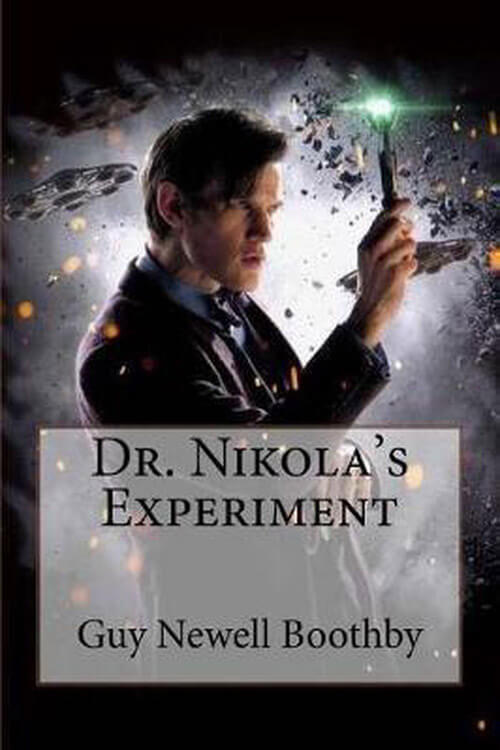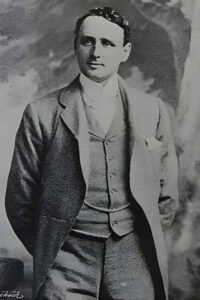
Dr. Nikola’s Experiment
It was Saturday afternoon, about a quarter past four, if I remember rightly. The Malu Road leading to “the Bubbling Spring,” the only place in Shanghai where one could draw the weather, was crowded with elegant carriages, ponies, bicycles, not to mention all kinds of Jinrickshaws, who followed each other in a long procession to the source. In contrast, the European part of the inhabitants of Shanghai, and a considerable number of the natives, were drawn out to watch a race, which, though not very exciting, in and in itself was important, as it was the only pleasure the colony had that afternoon.
I had walked quite a distance and had then taken a Jinrickshaw, more out of vanity than because I could afford it. To tell the truth, and it will come out once in a while, no matter how hard I tried to prevent it, I kept the leather straight, and although I lay back in my vehicle and smoked my Cherut with a princely mine, I was still me embarrassingly aware that when I had to pay for that journey, my coffers would hardly survive the battle.
I had been more than ordinary unlucky since my arrival in Shanghai. I had applied for all available places, from the very best to the secretary’s post at a club that had communist tendencies and was located somewhere on the border of the Chinese town – but still without success. To get the one I did not have sufficient protection, to get the other I could not flatter myself, which is so essential when you are looking for certain things.
However, my expenses were not lessened, and I soon realized that if nothing happened, and quickly, I had every prospect of losing everything I owned and would have to seek my night’s lodging down by the river bank, and I would come to figure in the mixed court, which every European justly fears because I owed money to a Jew from Cochinkina. The position was not a happy one, from whatever side I looked at it, but I had gone through it quite a few times before and had always come out of it, if not with increased self-esteem then without any very great personal embarrassment.
When I arrived at the Source, I paid my Coolie and stood up where the last Jump was to take place. There was a fence and a grave, which were considerably difficult to manage. I came just at the last moment, for a moment later the horses came running. Some managed the difficulties, others did not want to leap, and still others chose a middle way, jumped up on the fence, tripped, and threw their riders headfirst into the mud. Admittedly, it wasn’t a pretty picture, but it was funny.
When the last horse was finished, and I thought that the sport was over for the day, I was about to go on my way, when a warning was called, and I turned and saw a belated rider coming hurrying towards the fence. Although he rode very briskly and determinedly and wanted to end the day with a beautiful effort, it was clear that his horse did not think the same, for when it was a score of feet from the fence, it slowed down and tried to stand. The result was not at all what I expected. The rider whipped loose, and the horse decided to jump, jumped too late, and hit its head against the fence, so it somersaulted and crashed. The rider fell into the pit, from which I immediately pulled him up. When he came up, he didn’t look good, but that didn’t stop him from recognizing me.
“Now I’ve seen it, it’s Wilfred Bruce!” he exclaimed, getting up and wiping his face with a very dirty handkerchief. “It was a lucky meeting then! I tell you, I spent two hours this morning looking for you.”
“It pains me that you have had so much trouble,” I replied. “But tell me, are you sure you haven’t been hurt?”
“Not a trace,” he replied, and when he had scraped off as much mud as he could, he turned to face his horse, which had regained its feet and was staring listlessly around.
Read or download Book
Guy Newell Boothby
Guy Newell Boothby (13 October 1867 – 26 February 1905) was a prolific Australian novelist and writer, noted for sensational fiction in variety magazines around the end of the nineteenth century. He lived mainly in England. He is best known for such works as the Dr Nikola series, about an occultist criminal mastermind who is a Victorian forerunner to Fu Manchu, and Pharos, the Egyptian, a tale of Gothic Egypt, mummies’ curses, and supernatural revenge. Rudyard Kipling was his friend and mentor, and his books were remembered with affection by George Orwell.
Biography
Boothby was born in Adelaide to a prominent family in the recently established British colony of South Australia. His father was Thomas Wilde Boothby, who for a time was a member of the South Australian Legislative Assembly, three of his uncles were senior colonial administrators, and his grandfather was Benjamin Boothby (1803–1868), controversial judge of the Supreme Court of South Australia from 1853 to 1867. When Boothby was aged approximately seven his English-born mother, whom he held in great regard, separated from his father and returned with her children to England. There he received a traditional English grammar school education at Salisbury, Lord Weymouth’s Grammar (now Warminster School), and Christ’s Hospital, London.
Following this, Boothby returned alone to South Australia at 16, where, in his turn, he entered the colonial administration as private secretary to the mayor of Adelaide, Lewis Cohen, but was “not contented” with the work. Despite Boothby’s family tradition of colonial service, his natural inclinations ran more to the creative than to the administrative and he was not satisfied with his limited role as a provincial colonial servant. In 1890, aged 23, Boothby wrote the libretto for Sylvia, a comic opera, published and produced at Adelaide in December 1890, and in 1891 his second show, The Jonquil: an Opera, appeared. He also wrote and performed in an operetta, Dimple’s Lovers, for Adelaide’s Garrick Club theatre group. The music in each case was written by Cecil James Sharp. His early literary ventures were directed at the theatre, but his ambition was not appeased by the lukewarm response his melodramas received in Adelaide. When severe economic collapse hit most of the Australian colonies in the early 1890s, he followed the well-beaten path to London in December 1891.
Boothby, however, was thwarted in his first bid for recognition as lack of funds forced him to disembark en route in Colombo, Sri Lanka, and begin making his way homewards through South East Asia. According to family legend, the dire poverty he faced on this journey led him to accept any kind of work he could get: ‘This meant working before the mast, stoking in ocean tramps, attending in a Chinese opium den in Singapore, digging in the Burmah Ruby fields, acting, prize fighting, cow punching…’ This was followed by a brief sojourn on Thursday Island, a Melanesian island in the Torres Strait group recently annexed by the Queensland colony, where he worked as a diver in the lucrative pearl trade; and finally by an arduous journey overland across the Australian continent home to Adelaide. While Depasquale, author of the only Boothby biography, warns that this account of his travels may be somewhat glamorous, Boothby certainly traveled extensively in South East Asia, Melanesia, and Australia during this period, collecting a stock of colonial anecdotes and experiences that were to influence much of his later writing.
Approximately two years later, Boothby finally reached London and succeeded in having an account of his peregrinations, On the Wallaby, or Through the East and Across Australia, published in 1894. The travelogue met with reasonable success, which was matched later that year by Boothby’s first novel, In Strange Company. A novel of adventure set variously in England, Australia, the South Seas, and South America, In Strange Company established a pattern that was to characterize the succeeding Boothby oeuvre – the use of exotic, international, and particularly Australasian locales that frequently function as an end in themselves superfluous to the requirements of the plot. By October 1895, Boothby had completed three further novels, including A Bid for Fortune, the first Dr Nikola novel which catapulted Boothby to wide acclaim. Of the two other novels Boothby wrote in 1895 A Lost Endeavour was set on Thursday Island and The Marriage of Esther ranged across several Torres Strait Islands. Boothby continued to produce fiction at a ferocious rate, producing up to six novels a year across the range of genres prevalent at the fin de siècle and is credited with producing over 53 novels in total, not to mention dozens of short stories and plays.






